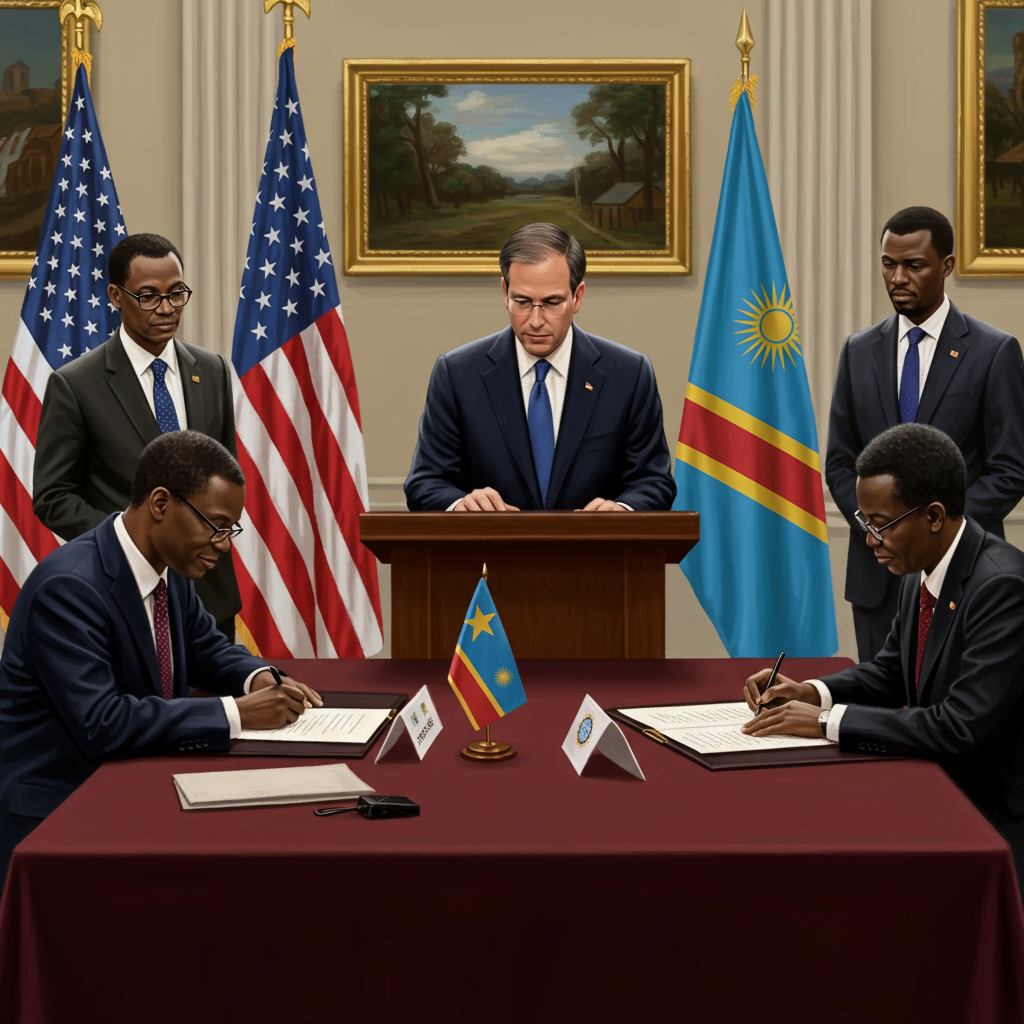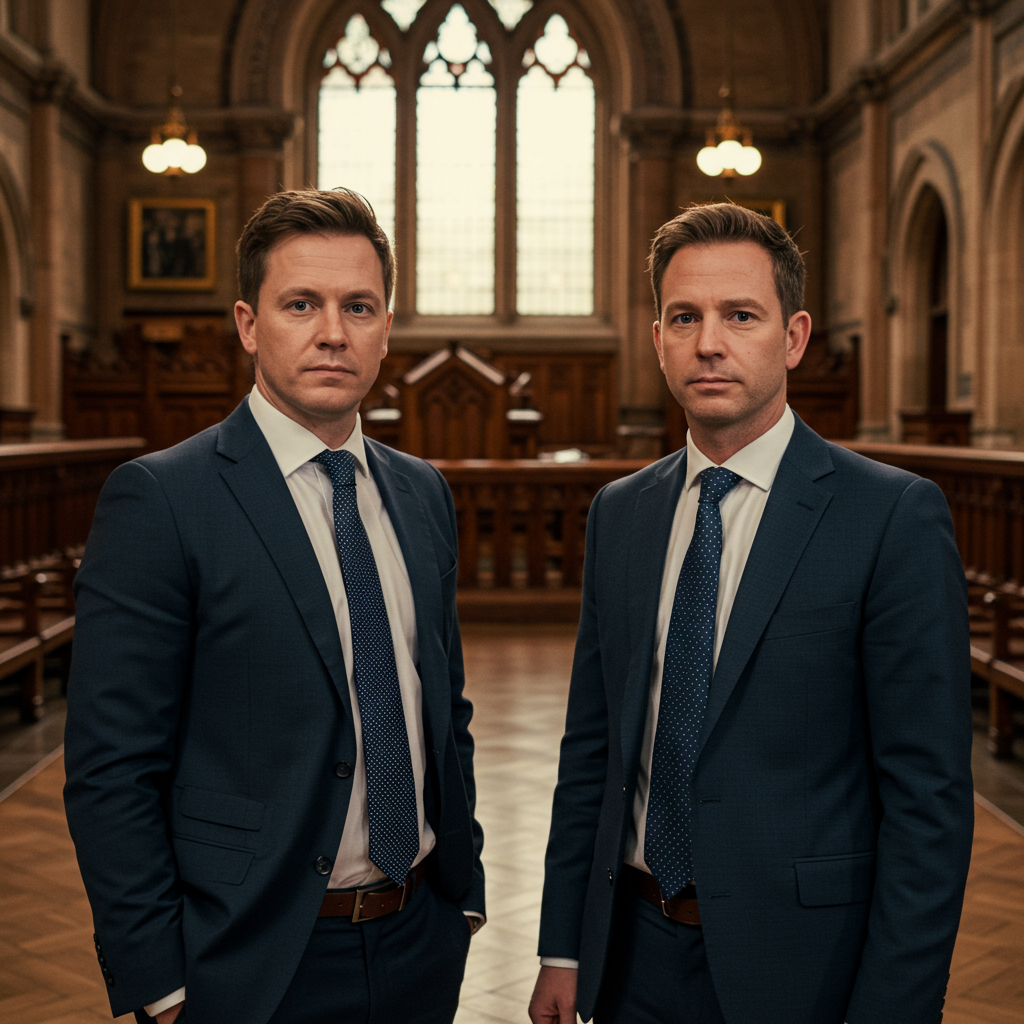Hopes and Doubts as Historic Peace Deal Signed
In a moment aimed at stemming years of devastating violence in the eastern Democratic Republic of Congo (DRC), officials from the DRC and Rwanda gathered in Washington D.C. on Friday, April 25, 2025, to sign a “Declaration of Principles.” Hosted by US Secretary of State Marco Rubio, the agreement marks a significant diplomatic effort brokered by the White House.
The deal targets the complex conflict in the eastern DRC, where the M23 militia, allegedly backed by Rwanda, controls large territories. While framed by figures like former US President Donald Trump as a “wonderful treaty” poised to deliver peace, the accord faces deep skepticism from many who question its ability to resolve the deep-seated issues fueling the violence. Adding to the uncertainty, the M23 militia itself has yet to publicly commit to laying down its weapons.
Trump has been vocal about his role in brokering the agreement, hinting at his desire for recognition, though suggesting he wouldn’t receive a Nobel Peace Prize for this or other diplomatic efforts, including potential future outcomes in conflicts like Russia/Ukraine or Israel/Iran. His involvement in global conflicts has expanded, positioning himself as a “peacemaker,” potentially aligning with US economic interests in the mineral-rich eastern DRC, particularly access to critical minerals like cobalt and coltan. This pattern of linking high-level diplomacy to strategic economic goals echoes other instances of the Trump administration pursuing complex international negotiations, such as reported secret efforts to restart talks with Iran involving significant financial incentives tied to specific conditions aimed at limiting nuclear capabilities.
The signing ceremony saw DRC’s Foreign Minister Thérèse Kayikwamba Wagner and Rwanda’s Foreign Minister Olivier Nduhungirehe formalize the agreement.
The Human Cost of Conflict
The fighting in eastern DRC has exacted a horrific toll. Since January alone, a fresh offensive by the M23 militia against the Congolese army has reportedly led to over 7,000 deaths and displaced approximately one million people. Occupied areas have seen increasing reports of summary executions, including of children, alongside a widespread epidemic of rape and sexual violence, according to aid groups.
Images capture the plight of those caught in the middle, showing displaced families waiting to return home or individuals lining up for checks at border crossings, desperate for safety and stability amidst the ongoing turmoil.
Understanding a Complex, Mineral-Fueled War
The crisis in eastern DRC, which shares a volatile border with Rwanda and holds vast deposits of minerals essential for electronics and electric vehicle production, is a tangled web of historical, political, and economic factors.
Experts highlight that the animosity between the DRC and Rwanda stems from deep roots, including:
Colonial-era border disputes: Lingering disagreements over territorial lines drawn during colonization.
Unresolved regional tensions: Historical grievances and mistrust between nations in the Great Lakes region.
Aftermath of the 1994 Rwandan genocide: The genocide, which saw the slaughter of hundreds of thousands of Tutsis and moderate Hutus, pushed perpetrators and victims into eastern DRC, contributing to instability and the rise of various armed groups.
Rwanda accuses the DRC of integrating a proscribed Hutu militia group into its army, presenting this as an “existential security threat” to Rwanda. Conversely, the international community and UN experts widely believe Rwanda actively supports the M23, a predominantly Tutsi militia, with troops and resources, leading to accusations of territorial violation against the DRC. The M23 claims to defend the interests of Congolese Tutsis and minorities of Rwandan origin while also battling for control of the region’s lucrative mineral wealth.
Evidence suggests minerals mined in M23-held areas, particularly North and South Kivu provinces, are being fraudulently exported through Rwanda. While Rwandan President Paul Kagame acknowledged his country served as a transit point for minerals from DRC, he denied outright theft.
Key Provisions of the US Peace Accord
The US-brokered agreement outlines several critical steps, according to a joint statement by the US, Rwanda, and the DRC:
Respect for Sovereignty: Affirming respect for territorial integrity and prohibiting hostilities.
Militia Disarmament: Provisions for the disengagement, disarmament, and potential conditional integration of non-state armed groups.
Humanitarian Focus: Facilitating the return of refugees and internally displaced persons, alongside ensuring humanitarian access.
Economic Cooperation: Establishing a regional economic integration framework designed to attract significant US investment into both countries.
Despite these provisions, a major rebel coalition, the Alliance Fleuve Congo (AFC), which includes M23, stated it was not part of the US-brokered talks. Instead, the AFC is committed to a separate negotiation process mediated by Qatar in Doha. A spokesperson for the AFC indicated that surrendering arms was “not there yet,” awaiting developments from the Doha talks.
Skepticism and the Quest for Lasting Peace
The path to peace remains fraught with challenges, and many observers are skeptical that this latest accord will succeed where numerous previous truces have failed. Fighting has often resumed shortly after such agreements.
A key concern is that the US-led talks may not address the fundamental root causes of the conflict. These include:
Unequal Wealth Distribution: The DRC is immensely rich in critical minerals like cobalt (world’s largest reserves) and coltan but ranks among the poorest nations, with mineral wealth benefiting only a small elite and foreign entities while ordinary citizens suffer.
Weak Governance: The country struggles with weak institutions and limitations on dissent.
Lack of Accountability: Critics argue that past aggressions and resource plundering haven’t been adequately addressed.
Congolese human rights activist Denis Mukwege, a Nobel laureate, has publicly criticized the deal as “vague” and potentially “tilted in Rwanda’s favor.” He argues it fails to acknowledge “Rwanda’s aggression” and risks “whitewashing” past crimes, effectively “rewarding aggression” and legitimizing the exploitation of Congolese resources by forcing the victim to sacrifice justice for a potentially fragile peace.
Both analysts and activists emphasize that true, lasting peace requires a more comprehensive approach than formal agreements alone. They call for:
Genuine accountability for past actions.
A process of regional truth-telling.
Equitable redistribution of the nation’s mineral wealth.
Significant governance reforms.
- A broad national dialogue that includes all Congolese voices, not just political elites or foreign allies.
- keyt.com
- localnews8.com
- krdo.com
- keyt.com
- wagingnonviolence.org
Without addressing these core issues, peace in eastern DRC may remain a “fragile illusion,” as one activist warned, underscoring the long, difficult road ahead despite the signing of this high-profile agreement.


